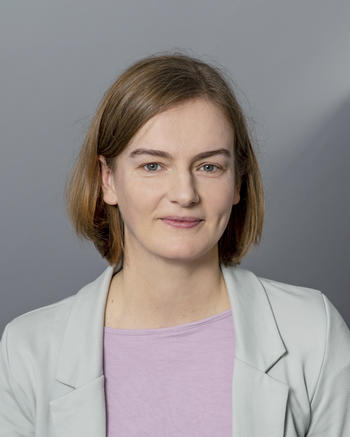Dr. Ewa Aleksandra Dąbrowska

Freie Universität Berlin
Project "War in Ukraine, Russia’s potential decoupling from the global internet and the changing perspective of emerging powers on internet and data governance"
Postdoctoral Researcher, RU Orders
14195 Berlin
Ewa Aleksandra is a social scientist and political economist. She obtained her PhD from the University of Amsterdam with the thesis "Authoritarian politics of ideas, interests and policy change. Finance and development in Putin's Russia" and did research at the Hamburg Institute of International Economics and the Higher School of Economics in Russia. Her research interests include economic (especially industrial and digital) policy in illiberal regimes, new conservatism and populism and a "turn to Asia" and Africa in Eastern and East Central Europe.
Research Interests
- Industrial and digital policy
- Russian economy and economic policy,
- New conservatism and populism in Poland, Russia and Hungary
- Economic policy in illiberal regimes
- Rise of economic interest in Asia and Africa in Eastern and East Central Europe
- Internet and data governance
- Digital economy
- Internet and data governance in the Global South
Current Research projects at SCRIPTS
Ewa currently works in the project "War in Ukraine, Russia’s potential decoupling from the global internet and the changing perspective of emerging powers on internet and data governance".Russia’s war against Ukraine, the reaction of Western states, information intermediaries, such as Meta, Apple or Google, and the prospect of Russia disconnecting from the global internet have shaken the worldwide consensus on internet governance. The war demonstrated that digital and economic interdependence is a risk factor for countries that break international law and disrespect human rights. As a result, emerging powers increasingly perceive digital interdependence as a source of fragility and embrace the notion of digital sovereignty. The project aims at examining both the trajectory of Russia’s political project of internet and data sovereignty as well as the embrace of sovereigntism by some emerging powers before and due to the war in Ukraine and its repercussions. The growing popularity of the concept of internet and data sovereignty, especially in its authoritarian variant, constitutes a challenge to the liberal script inherent in the idea of global connectivity and internet governance as embodied by multistakeholder governance. At the same time, it has potential to improve representation of emerging powers’ interests in the structures of this governance.
Journal Articles (peer reviewed)
- Dabrowska, E, and Zweynert, J (2015), 'Economic Ideas and Institutional Change: The Case of the Russian Stabilization Fund'. New Political Economy 20 (4), pp. 518-544.
Book Chapters
- Dabrowska, E (2018), 'New Conservatism in Poland: the discourse coalition around Law and Justice' in Katharina Bluhm and Mihai Varga (eds), New Conservatives in Russia and East Central Europe, Routledge.
- Dabrowska, E, Buzogány A. and Varga M (2018), "'The Budapest-Warsaw Express': conservatism and the diffusion of economic policies in Poland and in Hungary" in Katharina Bluhm and Mihai Varga (eds), New Conservatives in Russia and East Central Europe, Routledge.
Dissertation (Published at the University of Amsterdam)
- Dabrowska, E (2019), ‘Authoritarian Politics of Ideas, Interests and Policy Change. Finance and Development in Putin’s Russia’. Dissertation, University of Amsterdam, https://dare.uva.nl/search?identifier=b5c12546-ce19-4284-80e5-d09db154e369.
Other Publications
- Dabrowska, Ewa (2024) How Russia is Trying to Take the Sting out of Western Technological Sanctions, Zois Spotlight 17/2024, https://www.zois-berlin.de/en/publications/zois-spotlight/how-russia-is-trying-to-take-the-sting-out-of-western-technological-sanctions
-
Dabrowska, Ewa (2023), Interview für das Podcast „Geofaktor“ von Deutsche Welle, ‚V Indii rastet doverie k Putinu – kak Zapadu ubedit‘ global’nyj yug podderzhat‘ Ukrainu i sanktsii?‘ (auf Russisch), https://www.youtube.com/watch?v=p_CQdlVPhsc.
-
Dabrowska, Ewa (2023), Beitrag zur Diskussion über die Shanghaier Organisation für die Zusammenarbeit, Stiftung für die Freiheit, https://www.youtube.com/watch?v=xQ-LM7OBW7I&t=642s.
- Ewa Dąbrowska (2023), Mächte des Globalen Südens und der Krieg gegen die Ukraine, Zois Spotlight 1/2023, https://www.zois-berlin.de/publikationen/zois-spotlight/maechte-des-globalen-suedens-und-der-krieg-gegen-die-ukraine.
- Ewa Dąbrowska (2023), Rezension von Kathrin Suder, Jan F. Kallmorgen „Das Geopolitische Risiko. Unternehmen in der neuen Weltordnung“, Ökologisches Wirtschaften 1. Nachhaltige Stadtentwicklung.
- Dąbrowska, E and Lechowski, G (2023), 'Die Zukunft wird multipolar. Geopolitische Verschiebungen in der Digitalwirtschaft', WZB Mitteilungen 180, Juni 2023.
- Ewa Dąbrowska (2022), Rezension von Christoph Scherrers „Macht in weltweiten Lieferketten“, Ökologisches Wirtschaften 4. Kultur und Nachhaltigkeit.
- Ewa Dąbrowska (2022), Digital sanctions against Russia and geopolitization of the Internet, SCRIPTS Blog Post No. 63, 19.12.2022, https://www.scripts-berlin.eu/publications/blog/Blog-63-Dabrowska-Internet-Gov/index.html.
- Dabrowska, E et al. (2020), 'Responsible Europe', Friedrich Ebert Foundation.
- Dabrowska, E (2019), 'Wirtschaftspolitik für die Menschen? Die ökonomische Komponente der Herrschaft von Recht und Gerechtigkeit' Histoires Continentales.
- Dabrowska, E and Müser O (2019), 'Neuer Akteur mit alten Ideen? Think Tanks und Zivilgesellschaft in der ukrainischen Wirtschaftspolitik'. ukraineverstehen.de.
- Dabrowska, E (2018), 'The End of the Reserve Fund, The End of an Era'. Intersection.
- Dabrowska, E (2018), 'Voucher-Privatisierung'. dekoder.
- Dabrowska, E et al. (2018), 'Islands of Cooperation'. Friedrich Ebert Foundation.
- Dabrowska, E (2017), 'Ein wirksames Mittel? Russlands kreativer Umgang mit Sanktionen'. Russlandanalysen.
- Dabrowska, E (2017), 'Debt and poverty: the thriving business of high-risk moneylenders in Russia'. open democracy.
- Dabrowska, E (2017), 'Sanctions Therapy?' Intersection.
- Dabrowska, E (2016), 'Problemkredite. Die PiS und die Franken-Schulden der Polen'. Osteuropa 6-7.
- Dabrowska, E (2016), 'Bank Rossija'. dekoder.
- Dabrowska, E (2016), 'Skolkowo'. dekoder.
- Dabrowska, E (2015), 'Patriotische Wende? Russlands Finanz- und Investitionspolitik'. Osteuropa 11-12.
- Dabrowska, E (2015), 'Inlandsinvestitionen und ‚deofschorisazija‘ - ein Paradigmenwechsel in der russischen Finanzpolitik'. Russlandanalysen.
- Dabrowska, E (2015), 'Default 1998'. dekoder.
- Dabrowska, E (2015), 'Staatliche Banken'. dekoder.
- Dabrowska, E (2015), 'Zentralbank'. dekoder.
- Dabrowska, E and Zweynert J (2014), 'Economic Ideas and Institutional Change: The Case of the Russian Stabilization Fund'. Working Paper No. 339. Regensburg: Institute for East and Southeast European Studies.
